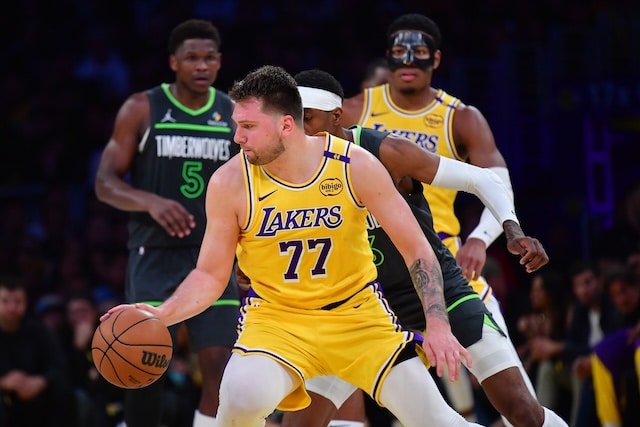Entering the 2025 NBA Playoffs, the Los Angeles Lakers were considered one of the league’s elite contenders. With a roster led by Luka Dončić and the legendary LeBron James, the Lakers finished as the Western Conference’s No. 3 seed and carried significant expectations. Oddsmakers at Royal Panda New Zealand gave them +1100 odds to win the NBA title—fourth-best in the league, trailing only the Oklahoma City Thunder, Boston Celtics, and Cleveland Cavaliers. Their blend of star power, postseason experience, and late-season momentum made them a popular pick to make a deep run.
However, the Lakers’ postseason journey ended abruptly in the first round. They were eliminated by the sixth-seeded Minnesota Timberwolves, who took the series 4-1. The Timberwolves, led by Rudy Gobert and Anthony Edwards, advanced to the Western Conference Finals to face the top-seeded Oklahoma City Thunder. For the Lakers, the defeat was not just a statistical anomaly—having never previously lost a first-round series as a top-three seed—but also a source of frustration and controversy, particularly regarding the officiating.
The Playoff Officiating Debate: A Different Game?
A persistent narrative in NBA circles is that officiating in the playoffs diverges from the regular season. While the official rulebook does not change, enforcing those rules often does. Playoff games are typically more physical, with referees allowing more contact and “letting them play” in the spirit of heightened competition. The league does not universally acknowledge this shift, but it is widely recognized by players, coaches, and fans alike.
During the regular season, the NBA strives for consistency, but there are complaints about uneven enforcement from game to game and referee to referee. In the playoffs, the stakes amplify every whistle, and the margin for error narrows. The result is a more scrutinized and often criticized environment for officials. The expectation is that referees will be both invisible and infallible—an impossible standard that inevitably leads to controversy.
The Lakers and Officiating Controversies in 2025
The Lakers’ first-round series against the Timberwolves was emblematic of the broader issues with playoff officiating. Several moments in the series, especially in Game 4, became flashpoints for debate. With the Lakers trailing in the final minute, Luka Dončić appeared to be tripped by Jaden McDaniels as he brought the ball up the court. No foul was called, leading to a turnover and Minnesota sealing the victory with free throws. Lakers head coach JJ Redick was outspoken in his criticism, insisting that Dončić “got tripped” and that the missed call was pivotal. “That was a blatant trip. He doesn’t just fall on his own,” Redick told reporters after the game, highlighting the frustration within the Lakers’ camp.
This was not an isolated incident. Throughout the series, Lakers players and coaches pointed to what they perceived as inconsistent whistle-blowing, especially in high-leverage moments. The grievance was compounded by the NBA’s Last Two Minute Reports, which sometimes acknowledged officiating errors but could not change the outcomes. For a team with championship aspirations, these moments loomed large.
Playoff Officiating vs. Regular Season: Why the Difference?
The NBA’s postseason is a fundamentally different environment from the regular season. The intensity and the stakes are more significant, and every possession is magnified. Referees, consciously or not, tend to adjust their approach. There is a greater tolerance for physicality, and a reluctance to decide games with marginal calls in the closing minutes. This “let them play” mentality allows the players, not the officials, to determine the outcome. However, it also introduces subjectivity that can lead to confusion and frustration.
Critics argue that this shift undermines the integrity of the game. If a foul is a foul in February, why is it not a foul in May? The lack of uniformity can disadvantage teams relying on finesse or star players who draw contact, benefiting those built on physicality and depth. The Lakers, with high-profile stars like Dončić and James, often found themselves on the wrong end of this equation during their series with Minnesota.
The Broader Playoff Officiating Conversation
The Lakers’ experience is not unique. Across the 2025 playoffs, fans and analysts have debated the quality and consistency of officiating. Social media has been awash with clips of questionable calls and missed fouls, not just in Lakers games but throughout the postseason. High-profile referees such as Tony Brothers, Marc Davis, and Scott Foster have drawn particular ire from fans, with their assignments in key games met with skepticism and, at times, outrage.
Commentators like Mike Breen have called for greater consistency, acknowledging that while a more physical style may be appropriate for the playoffs, it must be applied evenly to both teams and all players. The NBA’s transparency through Last Two Minute Reports is a step forward, but it does little to mollify teams who feel aggrieved in the moment.
The Aftermath: What’s Next for the Lakers and the League?
For the Lakers, the early exit is a bitter pill. Their championship window, defined by the aging LeBron James and the prime of Luka Dončić, is not guaranteed to remain open indefinitely. The focus will now turn to offseason adjustments, roster decisions, and, inevitably, the ongoing dialogue about how playoff games are officiated.
The 2025 NBA playoffs have again spotlighted the challenges of officiating at the highest level. The league must balance the desire for a more physical, competitive product with the need for fairness and consistency. As long as the perception persists that the playoffs are officiated differently—and that those differences can swing the fate of a series—controversy will remain an inescapable part of the NBA’s postseason drama.





